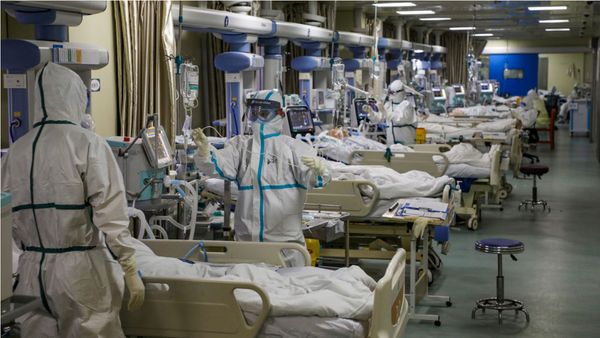
As it stands, Kilmar Abrego Garcia's story begins and ends in his native El Salvador.
When he was a boy, a local gang extorted his family, tried to indoctrinate him and threatened to kill him, according to his immigration case. He fled to the U.S. at 16.
He was forced back last month at 29, mistakenly deported by President Donald Trump's administration to a notorious prison that observers say is rife with abuse.
In between was his American life: Working construction, getting married and raising children with disabilities, according to court records. He was also accused by local police in Maryland of being an MS-13 gang member.
Abrego Garcia denied the allegation and was never charged, according to court records. A U.S. immigration judge ultimately granted him protection from being deported back to El Salvador in 2019 because he likely faced persecution there by local gangs.
Abrego Garcia is now at the center of a legal battle that has reached the U.S. Supreme Court and raises questions about due process and the Trump administration’s ability — or willingness — to retrieve him from El Salvador.
The White House described Abrego Garcia’s deportation to his native country as an “administrative error." It claims he's in MS-13, citing the 2019 allegation from Maryland police, and argues the U.S. government lacks the authority to get the Salvadoran national back from his native country.
Attorneys for Abrego Garcia said there's no evidence of gang membership. They claim the U.S. government has the power to return him, while noting that it's paying El Salvador for his imprisonment.
Chief Justice John Roberts agreed on Monday to pause a lower court's midnight deadline for the Trump administration to return Abrego Garcia. As his case continues, here is his story so far:
Gang threats in El Salvador
Abrego Garcia grew up in El Salvador's capital city, San Salvador, according to court documents filed in U.S. immigration court in 2019. His father was a former police officer. His mother, Cecilia, sold pupusas, the nation's signature dish of flat tortilla pouches that hold steaming blends of cheese, beans or savory pork.
The entire family, including his parents, two sisters and older brother, ran the business from home, court records state. Abrego Garcia's job was to buy ingredients from the grocery store and make deliveries with his brother.
"Everyone in the town knew to get their pupusas from ‘Pupuseria Cecilia,’” his lawyers wrote.
A local gang, Barrio 18, began extorting the family for “rent money" and threatened to kill his older brother Cesar — or force him into their gang — if they weren't paid, court documents state. The family complied but eventually sent Cesar to the U.S.
Barrio 18 similarly targeted Abrego Garcia, according to his immigration case. When he was 12, the gang threatened to take him away until his father paid them “all of the money that they wanted.” They still watched him as he walked to and from school.
The family moved 10 minutes away, but the gang threatened to rape and kill Abrego Garcia's sisters, court records state. The family shut down the business, moved again and eventually sent Abrego Garcia to the U.S.
The family never went to authorities because of rampant police corruption, according to court filings. The gang continued to harass the family after they moved to Guatemala, which borders El Salvador.
Life in the U.S.
Abrego Garcia fled to the U.S. illegally around 2011, according to documents filed in his immigration case. He joined Cesar, now a U.S. citizen, in Maryland and found work in construction.
About five years later, Abrego Garcia met Jennifer Vasquez Sura, a U.S. citizen, the records say. In 2018, after she learned she was pregnant, he moved in with her and her two children. They lived in Prince George’s County, just outside Washington.
In 2019, Abrego Garcia went to a Home Depot looking for work when he was arrested by county police, according to court filings. Detectives asked if he was a gang member. After explaining he wasn’t, he was detained by Immigration and Customs Enforcement.
Abrego Garcia later told an immigration judge that he would seek asylum and asked to be released. Vasquez Sura was five months into a high-risk pregnancy.
ICE, however, alleged that he was a certified gang member based on information that came from a confidential informant used by county police, records state.
According to Abrego Garcia’s attorneys in his current case, the criminal informant had alleged that Abrego Garcia belonged to an MS-13 chapter in New York, where he has never lived.
The information was enough for an immigration judge in 2019 to keep Abrego Garcia in jail as his immigration case continued, court records state. The judge said the informant was proven and reliable and had verified his gang membership and rank.
Abrego Garcia later married Vasquez Sura in a Maryland detention center, according to court filings. She gave birth while he was still in jail.
In October 2019, an immigration judge denied Abrego Garcia’s asylum request but granted him protection from being deported back to El Salvador because of a “well-founded fear” of gang persecution, according to his case. He was released and ICE did not appeal.
Since then, Abrego Garcia has checked in with ICE yearly while the Department of Homeland Security issued him a work permit, his attorneys said in court filings. Abrego Garcia joined a union and was employed full time as a sheet metal apprentice.
He and Vasquez Sura were raising three kids, including their 5-year-old son, who has autism, is deaf in one ear and unable to verbally communicate, according to the complaint filed against the Trump administration. They're also raising a 9-year-old with autism and a 10-year-old with epilepsy.
Mistaken deportation
In February, the Trump Administration designated MS-13 as a foreign terrorist organization and sought to remove identified members “as expeditiously as possible,” U.S. Solicitor General D. John Sauer wrote in Monday's brief to the Supreme Court.
Abrego Garcia was pulled over March 12 outside an IKEA in Baltimore with his son, according to court records. An agent called Vasquez Sura and said she had 10 minutes to retrieve their son or ICE would request child protective services.
Abrego Garcia called his wife from jail and said authorities pressed him about MS-13, according to court documents. They asked about a photo they had of him playing basketball on a public court, and his family’s visits to a restaurant serving Mexican and Salvadoran food.
“He would repeat the truth again and again — that he was not in a gang,” Vasquez Sura stated in court documents.
Meanwhile, the Trump administration, in its court filings, has pointed to the confidential informant in Prince George's County who deemed him to be a member of MS-13.
Abrego Garcia was sent to El Salvador's Terrorism Confinement Center, or CECOT, where inmates are packed into cells and never allowed outside. The nation's justice minister has said that those held there would never return to their communities.
Vasquez Sura recognized Abrego Garcia by his tattoos and head scars in photos from the prison, where she saw video of him being dragged by guards, according to court documents.
Musk’s growing feud with Trump trade adviser over tariffs dismissed by White House
Congo repatriates 3 Americans who had faced death sentences over a failed coup plot
What is the Insurrection Act of 1807 and will Trump invoke it?
Trade friction from Trump tariffs could put supply of 85% of NHS medicines at risk
Streeting signals support for prostate screening if backed by evidence
Member of Rubio’s security team arrested in Brussels after fight with local police







